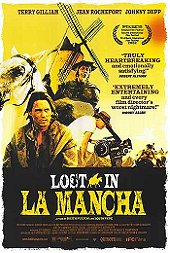
For years, Gilliam dreamed of creating his own cinematic incarnation of The Man Who Killed Don Quixote, and this documentary chronicles his attempt to finally achieve that vision. In the summer of 2000, Gilliam was ready to start shooting in Spain, but from the beginning, troubles were rampant, and there were echoes of Gilliam's troublesome endeavour to make The Adventures of Baron Munchausen back in the 1980s. He lands $32 million from European investors to budget The Man Who Killed Don Quixote, but that is only half of what a film of such scale would typically cost. Due to this, the production had to proceed without a hitch on meagre resources to make the film work. Unfortunately, it's a failure from the get-go, with troubled weather delaying shooting and the actors not arriving in time to accommodate proper rehearsals. The leading actor of the film, Jean Rochefort, suffers ailing health from the beginning, becoming so overwhelmed with pain that he can no longer ride a horse. Rochefort is hospitalised, and his absence is perpetually prolonged. Planes also fly overhead during the shooting of one scene, destroying the production audio and deafening the performers. It keeps getting worse and worse from there.
Fulton and Pepe intended to make a television documentary about the development and production of Gilliam's passion project, and in the process, they captured several turbulent events on camera. Hence, Lost in La Mancha is not a post-mortem dissection consisting mainly of interviews; instead, it's primarily fly-on-the-wall footage of production meetings, rehearsals, conversations between cast and crew, on-set activities, and, ultimately, behind-the-scenes havoc when the project degenerates into every director's worst nightmare. It's also interesting to see Johnny Depp here, completely candid and natural. Furthermore, Lost in La Mancha highlights the irony of the whole enterprise. You see, Don Quixote is a notoriously cursed character to bring to the screen. Even Orson Welles continually tried to make a Don Quixote movie over several decades, but the filmmaker failed to complete the project before his death.

Lost in La Mancha is a brutally honest documentary piece that takes us behind the curtain and gives us unparalleled insight into this condemned production. Having spent time on film sets, I can say that this represents the most candid depiction of the stresses and exhilarations of being on-set, even emphasising the importance of one of the greatest unsung heroes of the business: the first assistant director (in this case, Gilliam's right-hand man Phil Patterson). Lost in La Mancha refuses to sugar-coat anything - as a matter of fact, many moments are extremely confronting. We see Gilliam's temper flare constantly, and it's heart-wrenching to witness the frank conversations that lead to the conclusion to scrap the picture. We even get a penetrating shot of Gilliam looking over footage after production has shut down, his face affected by disappointment and depression. If there's anything to criticise about this documentary, it's the brisk length. Lost in La Mancha clocks in at around 90 minutes, which frankly seems too short. The ending, in particular, seems a tad rushed, and it feels like more could have been done.
What's remarkable about Lost in La Mancha is its ability to underscore exactly why filmmakers love what they do while conveying that film sets can be both mundane and frustrating. This is a fascinating and highly captivating documentary, leaving me curious about what Gilliam's movie might have looked like. We see snippets of the footage that was shot and glimpses of the costume and props department, not to mention storyboards and script pages. It looks as if this would've been another wildly creative and quirky Gilliam gem. (Gilliam would eventually make The Man Who Killed Don Quixote many years later but with a different cast.) For film buffs and Gilliam fans, Lost in La Mancha is a must-see.
8.3/10
 Login
Login